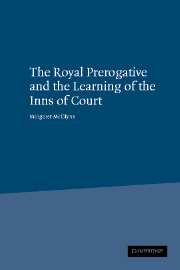Book contents
- Frontmatter
- Contents
- Preface
- List of figures
- List of abbreviations
- Introduction
- 1 The early readings
- 2 Expansion and debate
- 3 Frowyk and Constable on primer seisin
- 4 Spelman, Yorke, and the campaign against uses
- 5 The Edwardian readers and beyond
- Conclusion
- Notes on the appendixes
- Appendix 1 Thomas Frowyk's reading on Prerogativa Regis
- Appendix 2 John Spelman's reading on Prerogativa Regis
- Bibliography
- Index
Introduction
Published online by Cambridge University Press: 04 July 2009
- Frontmatter
- Contents
- Preface
- List of figures
- List of abbreviations
- Introduction
- 1 The early readings
- 2 Expansion and debate
- 3 Frowyk and Constable on primer seisin
- 4 Spelman, Yorke, and the campaign against uses
- 5 The Edwardian readers and beyond
- Conclusion
- Notes on the appendixes
- Appendix 1 Thomas Frowyk's reading on Prerogativa Regis
- Appendix 2 John Spelman's reading on Prerogativa Regis
- Bibliography
- Index
Summary
Throughout the Middle Ages, land was the central source of power in England. It was the basis for wealth, for authority, for jurisdiction, and for military strength. Despite ongoing arguments between historians about our construction of feudalism – the validity of the term, the breadth of its application, and the level of systematization it implies – the distribution and organization of land in England through the Middle Ages was in some way feudal. There is no doubt that what it meant to be feudal changed over the course of the Middle Ages, but to reduce the idea to its most basic level, land was held by tenants from lords and tenants returned service to their lords for that land. Lords retained certain rights over their tenants and their land, the most important of which applied at the death of their tenant, such as escheat for failure of heirs, and, for tenants who held in knight service, the wardship and marriage of minor heirs. The relationship between lord and tenant changed between the eleventh and fifteenth centuries, as did the kinds of service rendered, the kinds of jurisdiction exercised, and the ways in which military strength was exercised. However, the basic language of lordship and service remained intact.
Throughout this period, the king also remained the chief feudal lord of the kingdom. His power came both from his status as king and from his position as the most substantial landlord in the kingdom.
- Type
- Chapter
- Information
- Publisher: Cambridge University PressPrint publication year: 2003



